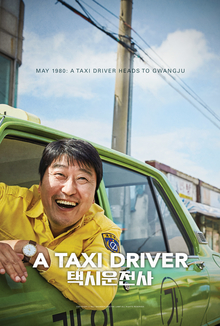
Once again this film stars the ubiquitous Song Kang-ho but at least this time the director Jang Hoon is a newcomer. Though the film’s innocuous title and poster doesn’t drop any hints, this is really about a historical event, the so-called Gwangju Uprising that took place in 1980. I haven’t known about this event beforehand so learning about it was good. However a cursory reading up on it reveals that this version involves substantial artistic license.
Kim Man-seob is a widowed taxi driver in Seoul who works hard to support his daughter. Upon hearing another driver talk about a foreigner willing to pay a great deal of money to go to the city of Gwangju, he intercepts the fare. The client is Jürgen Hinzpeter, a German reporter who has come to cover the anti-government protests in South Korea. Having heard that Gwangju has been completely cut off, he is determined to go see for himself and Kim is happy to take him, not realizing the risk involved. After bluffing their way through an army checkpoint, they find themselves in what looks like a war zone as the army has lost control of the city and started killing protesters. The residents fete Hinzpeter for showing the truth about what is happening to the world and while Kim is initially grumpy about students who have nothing better to do than protest, but even he has a change of heart once he sees the soldiers brutally gun down defenceless civilians.
The first half of the film is a decent enough family drama, focusing on Kim being an average guy too busy trying to survive to care much about politics. I liked seeing its portrayal of 1980s South Korea even if it seems to mostly consist of period-appropriate cars and the duo’s trip to Gwangju and their initial shock at what they see there make for good cinema. Unfortunately the film goes off the rails somewhat once the shooting starts in earnest as the director tries too hard to show the cruelty of the soldiers and the terrible plight of the protesters with too many repetitive shots of fleeing civilians being shot and jack-booted thugs beating people up. Then in an effort to show how the people are united in standing up to the government and determined to get the truth out, he has them performing stunts that make this look like a common action movie. Then when Kim talks about how taking Hinzpeter where he wants to go despite the danger is part of the duty of a professional taxi driver, it gets downright cringey.
Then there’s how the film deviates from real life. It turned out for example that the real driver was eventually identified by his son who revealed that he was far from the clueless, passive participant shown and was instead someone who actively worked with foreign reporters. Such a change would I suppose be forgivable in the interests of a better story but more problematic is how superficially it covers the tragic events surrounding the uprising. There’s no attempt at all to explain the initial causes of the protests nor is there any mention of the fact that the protesters did in fact seize weapons from the authorities to attempt to fight back. Instead the director chooses to use the film’s extensive running story to dramatize the events from a single person’s perspective and even that isn’t very well done. The pacing is bad, the driver’s plight with his daughter too blatantly calculated to elicit sympathy, and it’s all compounded by silliness such as how he is able to zip in and out of Gwangju with zero problems without his passenger before he has a guilt attack.
There’s no doubt that this is fantastic subject matter for a film and Song Kang-ho’s skills as an actor is well proven. But in the hands of an inexperienced and unproven director, A Taxi Driver is simply not a film to be taken seriously and this important event in the history of South Korea deserves a far better treatment than this.
One thought on “A Taxi Driver (2017)”